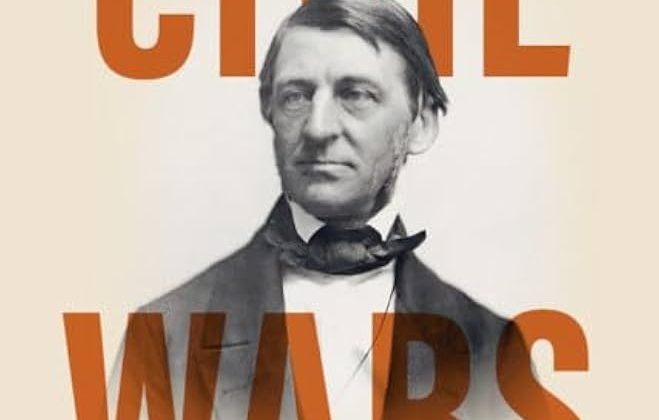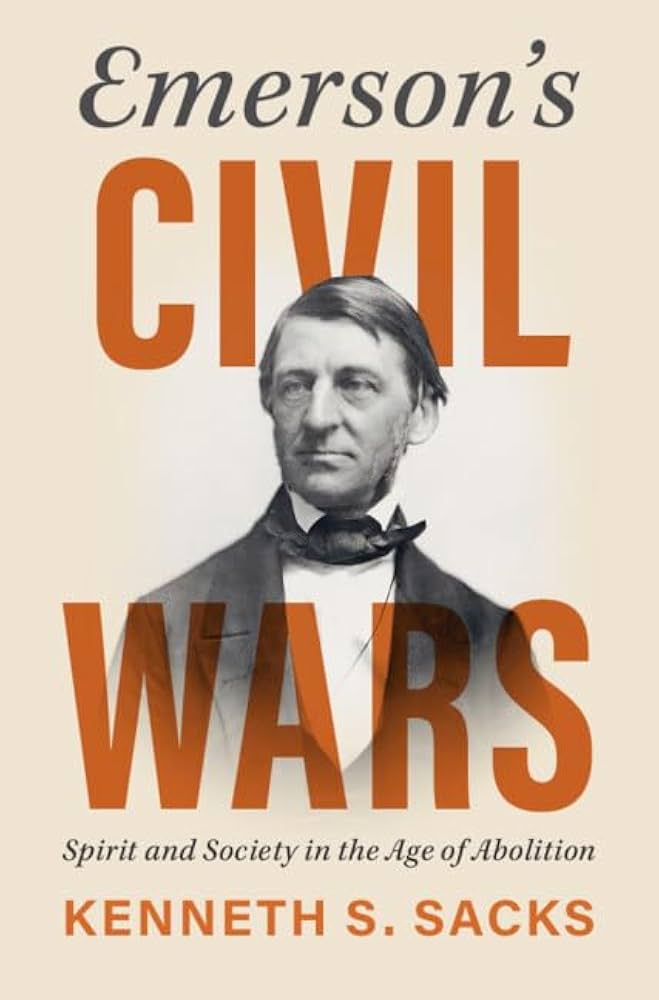

Kenneth S. Sacks is Professor of History and Classics at Brown University. This interview is based on his new book, Emerson’s Civil Wars: Spirit and Society in the Age of Abolition (Cambridge University Press, 2024).
JF: What led you to write Emerson’s Civil Wars?
KS: I had been writing a book on Emerson after the Civil War. But it was archive-based, and the pandemic forced me to rethink my project. I had long been skeptical about the recent scholarly optimism that (i) Emerson had been an early abolitionist and (ii) his racist thinking essentially extinguished over time. So, I went back and did close readings of (i) his antislavery speeches and (ii) his thoughts on race in his massive (two million word) journal. They confirmed my earlier suspicion. So, I decided to explore these pre-Civil War questions from the safety of my study.
It was pretty easy showing that Emerson resisted friends and family in not become a full-throated abolitionist in the 1840s. In fact, his full conversion didn’t happen until the mid-1850s. It came about through three essential shifts in his thinking.
Emerson is most famous for his idea of self-reliance, which meant coming to one’s own decisions by accessing the spirit within. Emerson had always been fiercely anti-slavery. But it took a long time for him to understand how he could simultaneously join an organized movement, like abolitionism which demanded a large degree of conformity, and still be guided by his own spirit. This is what I think of as “second stage self-reliance.” Keeping true to his core belief, Emerson evolved into a far more robust democratic thinker.
As well, scholars have significantly underestimated Emerson’s essential Neoplatonic beliefs. Neoplatonism is third century pagan philosophy created in despair over the Roman decline and the Christian rise. It is more intellectually robust than any of the three Abrahamic monotheisms and highly attractive to nineteenth century Romantics who, while rejecting an anthropomorphic godhead, wanted to embrace a living spirit. Unlike Stoicism which can be read as nearly equally a philosophy of withdrawal and a philosophy of activism, Neoplatonism is far more a philosophy of individual spiritual connection. But just as he had with his closely associated self-reliance, Emerson eventually found insight in his Neoplatonism that aligned with civic responsibility.
As to Emerson’s personal racism, I think that is undeniable (although some highly respected scholars might disagree). But two things happened. First, he began to move away from that racism and understand the common humanity of us all; not completely perhaps, but largely so. Second, he came to understand that whatever he thought privately, it was essential that he become a leader in civil rights. He ended up giving some of the most daring and inspiring public pronouncements on racial equality.
At a time of national crisis that demanded public figures choose a side, self-reliance, Neoplatonism, and racism were Emerson’s burdens. Reconciling them with political activism was his “civil wars.” The final, and essential, element—Emerson’s trigger—was the violence done to his friends by opponents of abolition. Emerson seemed to have little true empathy for the unrelenting and profound violence done to black bodies. But he had enormous feeling for his white friends who were beaten by pro-slavery mobs and even by politicians. One of his dearest friends was abolitionist Charles Sumner who was beaten nearly to death in the chambers of the U.S. Senate by a Southern congressman while other senators watched. This was the tipping point for Emerson: it accelerated and concretized his more abstract intellectual thinking. By the end, he largely stood with John Brown in asserting that the only possible resolution to the abolition crisis was violence, but now violence done by the forces of liberation. Emerson’s support of Brown is sometimes considered a spark to the Civil War.
JF: In 2 sentences, what is the argument Emerson’s Civil Wars?
KS: Despite being a lifelong opponent of slavery as an institution, Emerson was slow to embrace abolition. He had to figure out how his core beliefs would survive a commitment to political activism when the political situation became impossible to ignore.
JF: Why do we need to read Emerson’s Civil Wars?
KS: Emerson is America’s most important public intellectual. He essentially invented that role and had enormous moral standing. His struggle to reconcile personal beliefs with national need was messy and imperfect, but it was heroic. It’s a lesson for us all, which is how I end the “Forward” to the book: “Preserving self within community is a challenge as old as time. Doing it while a nation faces an existential crisis is a question very much worth exploring.”
JF: Why and when did you become an American historian?
KS: I’m a trained and practicing ancient Greek historian. In 1999, I was asked to give a Phi Beta Kappa talk at Brown and decided to read and speak on Emerson’s famous “The American Scholar Address” which he gave to Harvard’s Phi Beta Kappa Society in 1837. I discovered a fundamental strain of ancient philosophy in it (some classical Stoicism, but mainly Neoplatonism). I decided to write an article and went to the Emerson archives in the Houghton Library at Harvard. When they brought out some documents, I said to the archivist: “this must be a mistake. These are actually Emerson’s letters, not copies.” The archivist smiled and said, “of course these are the originals.” Having spent an entire career reading printed copies of texts from thousands of years ago, touching the actual documents of someone living just a few generations back was for me a life-changing event. That became a book, and for the past two decades I’ve written far more on nineteenth century American intellectual thought than on ancient history. But much of it involves understanding the classical basis to those American thoughts, and that’s what we in the Classics call “reception,” which is a hot topic these days.
JF: What is your next project?
KS: At 77 years old, I’m doing something really stupid. I’m writing two books. I’d rather not be specific yet, because I don’t know how well this is going to go. But one is a photo-essay book about a famous cemetery, and the other is an exploration of a nineteenth century philosopher (not Emerson!) as a way of viewing the growth of institutionalism in America. The first book requires a lot of air travel to get to the cemetery; the second requires a lot of commuting time to the archives. Again, at 77, this might be a bit quixotic.
JF: Thanks, Kenneth!